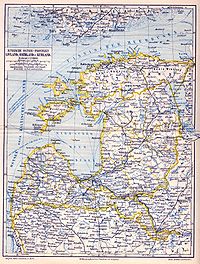
List of German exonyms for places in Latvia
Encyclopedia

Exonym and endonym
In ethnolinguistics, an endonym or autonym is a local name for a geographical feature, and an exonym or xenonym is a foreign language name for it...
in German
German language
German is a West Germanic language, related to and classified alongside English and Dutch. With an estimated 90 – 98 million native speakers, German is one of the world's major languages and is the most widely-spoken first language in the European Union....
for geographical
Geography
Geography is the science that studies the lands, features, inhabitants, and phenomena of Earth. A literal translation would be "to describe or write about the Earth". The first person to use the word "geography" was Eratosthenes...
places in the current and previous territory of Latvia
Latvia
Latvia , officially the Republic of Latvia , is a country in the Baltic region of Northern Europe. It is bordered to the north by Estonia , to the south by Lithuania , to the east by the Russian Federation , to the southeast by Belarus and shares maritime borders to the west with Sweden...
. The list is in alphabetical order according to the German exonyms with the Latvian endonyms
Exonym and endonym
In ethnolinguistics, an endonym or autonym is a local name for a geographical feature, and an exonym or xenonym is a foreign language name for it...
to their right. A large part of the Latgale
Latgale
Latgale is one of the four historical and cultural regions of Latvia recognised in the Constitution of the Latvian Republic. It is the easternmost region north of the Daugava River...
region of Latvia was included in the Polish-Lithuanian Commonwealth
Polish-Lithuanian Commonwealth
The Polish–Lithuanian Commonwealth was a dualistic state of Poland and Lithuania ruled by a common monarch. It was the largest and one of the most populous countries of 16th- and 17th‑century Europe with some and a multi-ethnic population of 11 million at its peak in the early 17th century...
(1569-1772), later in the Vitebsk
Vitebsk
Vitebsk, also known as Viciebsk or Vitsyebsk , is a city in Belarus, near the border with Russia. The capital of the Vitebsk Oblast, in 2004 it had 342,381 inhabitants, making it the country's fourth largest city...
Guberniya
Guberniya
A guberniya was a major administrative subdivision of the Russian Empire usually translated as government, governorate, or province. Such administrative division was preserved for sometime upon the collapse of the empire in 1917. A guberniya was ruled by a governor , a word borrowed from Latin ,...
of the Russian Empire
Russian Empire
The Russian Empire was a state that existed from 1721 until the Russian Revolution of 1917. It was the successor to the Tsardom of Russia and the predecessor of the Soviet Union...
(1804-1917), hence the common practice of transcribing Polish
Polish language
Polish is a language of the Lechitic subgroup of West Slavic languages, used throughout Poland and by Polish minorities in other countries...
exonyms into German when no German exonym existed. Exonyms in italics are the transcribed versions of the Polish or Russian
Russian language
Russian is a Slavic language used primarily in Russia, Belarus, Uzbekistan, Kazakhstan, Tajikistan and Kyrgyzstan. It is an unofficial but widely spoken language in Ukraine, Moldova, Latvia, Turkmenistan and Estonia and, to a lesser extent, the other countries that were once constituent republics...
exonyms for the places in question.
The German exonyms in this list are not used in Latvia today except by German-speaking tourists on sightseeing. The practical use of this list is more of an historical nature, for use in genealogy
Genealogy
Genealogy is the study of families and the tracing of their lineages and history. Genealogists use oral traditions, historical records, genetic analysis, and other records to obtain information about a family and to demonstrate kinship and pedigrees of its members...
, philately
Philately
Philately is the study of stamps and postal history and other related items. Philately involves more than just stamp collecting, which does not necessarily involve the study of stamps. It is possible to be a philatelist without owning any stamps...
, deltiology
Deltiology
Deltiology is the study and collection of postcards. Professor Randall Rhoades of Ashland, Ohio, coined a word in 1945 that became the accepted description of the study of picture postcards. It took about 20 years for the name to appear in the dictionary the first time...
and reading historical documents in general. Historically, many places were known only under their German names in Western Europe. There were quite a number of shtetl
Shtetl
A shtetl was typically a small town with a large Jewish population in Central and Eastern Europe until The Holocaust. Shtetls were mainly found in the areas which constituted the 19th century Pale of Settlement in the Russian Empire, the Congress Kingdom of Poland, Galicia and Romania...
s in Latvia prior to World War II and the Holocaust, which means that transcribed Yiddish exonyms in Latin letters of places in Latvia also exist.
Exonyms in this list were used in the first half of the 20th century and perhaps somewhat earlier. The spelling of the exonyms changes the further back in time they occur, since the German language
History of German
The history of the German language as separate from common West Germanic begins in the Early Middle Ages with the High German consonant shift. Old High German, Middle High German and Early Modern High German span the duration of the Holy Roman Empire...
changed considerably during the seven centuries of German presence in the Baltics.

